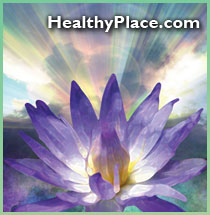Alternative Treatments for Anxiety Disorders
 Contents:
Contents:
- Aromatherapy
- Acupuncture
- Bach's Flower Remedies
- Reiki
- Herbalism
- Homeopathy
- Massage
- Shiatsu
- Yoga
- Meditation
Aromatherapy for Treatment of Anxiety and Stress:
Chronic anxiety can contribute to many health problems, but aromatherapy has a quick and simple method for reducing it, according to aromatherapist Valerie Ann Worwood in her new guide, The Fragrant Mind. Aromatherapy works with the essential oils of plants, prepared in any of the following ways, says Worwood: blend with 1 ounce of base oil to make a massage oil; add to bath water; gently heat in a room diffuser; or inhale from a tissue.
- Tense Anxiety—Symptoms include bodily tension, muscle pains, aches, and a generalized soreness. Mix clary sage (10 drops), lavender (15 drops), and Roman chamomile (5 drops).
- Restless Anxiety—Here one feels dizzy, sweaty, overactive, with palpitations, the sense of a lump in the throat, frequent urination, diarrhea, or upset stomach. Worwood recommends vetiver (5 drops), juniper (10 drops), and cedarwood (15 drops).
- Apprehensive Anxiety—Symptoms generally include worrying, brooding, unease, a sense of foreboding, even paranoia. For relief of this emotional state, try mixing bergamot (15 drops), lavender (5 drops), and geranium (10 drops).
- Repressed Anxiety—This variant of anxiety involves feeling on edge, concentration difficulties, irritability, insomnia, or a sense of chronic exhaustion. Worwood advises a blend of neroli (10 drops), rose otto (10 drops), and bergamot (10 drops).
Acupuncture for Treatment of Stress:
Acupuncture is primarily concerned with regulating the individual's life force, the body energy or 'Qi'. It has a number of beneficial physiological effects -- Acupuncture has a relaxation response with decreased heart rate, lowered BP, stress reduction and increased energy and tissue regeneration. It has been shown to produce a calming or tranquilizing action that is of particular interest to people in states of stress. Acupuncture can relieve feelings of anxiety and depression, which may be serious handicaps for people trying to cope with difficult domestic, social and work problems. It can give a person a feeling of well-being and self-confidence. It is an effective substitute for sleeping pill, tranquilizers, and antidepressant drugs. Acupuncture can be used in many cases not only as an alternative to these drugs but also to treat side effects and dependence. In fact a number of patients have come for acupuncture treatment specifically to come off their antidepressants. There is considerable evidence that acupuncture could substantially reduce the consumption of drugs such as Prozac.
Acupuncture can provide a safe and effective tool for stress. It will not, of course, change the circumstances of a person's life, but it will usually produce a feeling of well-being. The practitioner can help restore balance and thus protect health by identifying each individual's unique energy profile to see where the weak spots are and where support is needed to restore balance. Acupuncture can open a window of opportunity. As the heavy feelings of stress are relieved, a person feels more confidence in his ability to cope with unpleasant aspects of his life situation and make necessary changes
Bach's Flower Remedies for Treatment of Anxiety and Stress:
"There is no true healing unless there is a change in outlook, peace of mind, and inner happiness." - Dr. Edward Bach, 1934
Edward Bach, medical doctor, bacteriologist, and homeopathic physician, dedicated his life to discovering a system of healing which would go beyond the diagnosis and treatment of physical symptoms to address the emotional and mental roots of disease. He came to realize that when people were treated on the basis of distinctive personality characteristics, rather than according to their disease, true healing could occur. Convinced that he would discover what he sought in nature, he began to explore the fields and forests of England in search of remedies which would be effective, pure, and inexpensive.
One day, the sight of dewdrops glistening on flower petals inspired him with the idea that the heat of the sun, acting through the dew, must draw out the healing essence of each flower Through the development of a method for extracting this essence and self-experimentation with the resulting essences he isolated flowers which addressed a broad range of psychological conditions. These became known as the Bach Flower Remedies.
Reiki Healing:
Reiki (pronounced "Ray-kee") is Japanese for "universal life-force energy". Reiki is a method of natural healing using the universal life force energy to promote healing.
When the energy in our body becomes imbalanced or depleted, due to stress or illness, our body can no longer heal itself. It needs help.
Reiki is a powerful hands-on healing technique in which this energy is drawn through the practitioner's body and then transferred to the client. Physical, mental, emotional and spiritual blocks are released during a healing to bring clients greater health, well-being and harmony.
Reiki supports the body's natural ability to heal itself. It vitalizes body, soul and mind.
Benefits of Reiki for Spiritual and Emotional Balance:
Reiki functions on all levels. Mental, spiritual, physically and emotionally. It balances the body's energies. It loosens up blocked energy and promotes a state of relaxation. It cleans the body of poisons and enhances deeper detoxification.
Herbalism for Treatment of Anxiety and Stress:
Herbs are used to relieve stress and tension. Herb relaxants include :
- Black Cohosh,
- Black Haw
- California Poppy
- Chamomile
- Cramp Bark
- Hops
- Hyssop
- Jamaican Dogwood
- Lady's Slipper
- Lavender
- Lime Blossom
- Misletoe
- Motherwort
- Pasque Flower
- Passion Flower
- Rosemary
- St.John's Wort
- Skullcap
- Valerian.
In addition to the herbs that work directly on the nervous system, the anti-spasmodic herbs - which affect the peripheral nerves and the muscle tissue - can have an indirect relaxing effect on the whole system. Remember the connection - if you can calm the nervous system, you'll calm the physical system.
Homeopathy for Treatment of Anxiety:
Homeopathy treats the patient as one integral unit of mind and body.
Homeopathic medicines for anxiety are selected on the basis of presenting symptoms, the site of manifestation and the personality of the patient. After taking homeopathic medicines, the patient can himself judge the response. He develops a general feeling of well-being and looks at life with a positive attitude. The associated symptoms like loss of appetite, insomnia, headaches also are greatly relieved.
Massage for Treatment of Anxiety and Stress:
The benefits of massage are :
| Enhancing general relaxation | Reducing muscular tension and associated discomfort | |
| Reducing anxiety | Improving sleep | Increasing feelings of well-being |
| Enhancing tissue elasticity and flexibility | Increasing range of motion in joints | Relaxing tight muscles |
| Relieving muscle aches and stiffness | Speeding recovery from exercise | Promoting well nourished - healthy skin |
| Improving circulation of blood + lymph | Improving immune system functioning | Improving energy flow |
Shiatsu for Spiritual and Emotional Balance:
Shiatsu is a form of physical therapy developed first in Japan based on traditional Chinese medical theory and various Japanese massage techniques. In a shiatsu treatment the practitioner uses direct pressure with hands and fingers on the client's body.
The practitioner works along energy channels (meridians) and on points along those channels (acu-points or tsubo) to stimulate the flow of energy (ki).
The primary focus in treatment is to establish an harmonious flow of energy through the meridians. The particular insight of eastern medical practice is in its understanding of energy and how energy is a dynamic force in the body. Shiatsu addresses all levels of the person (physical, mental, emotional and spiritual). The treatment is most often experienced as deeply relaxing and practitioners can work with conditions of both acute and chronic natures.
Yoga to Reduce Anxiety and Stress:
Everyone suffers from mild anxiety from time to time, but chronic anxiety takes a tremendous toll on the body, draining energy resources and keeping the body in a constant state of stress. The effects of anxiety are magnified when the body is not exercised: tension in the muscles builds, breathing remains constricted most of the time and the mind has no rest from the whirling thoughts and feelings that feed the anxiety.
Yoga helps you to access an inner strength that allows you to face the sometimes-overwhelming fears, frustrations, and challenges of everyday life. Yoga reduces stress in the body, breath, and mind by building coping skills with a small daily routine of exercise, breathing, and meditation. A few Yoga exercises practiced daily (especially if they are done just prior to meditation) help to regulate the breath and relax the body by gently releasing tension from the large muscle groups, flushing all parts of the body and brain with fresh blood, oxygen, and other nutrients, and increasing feelings of well-being. "Whole body" exercises such as the Sun Poses are particularly helpful because they encourage you to breathe deeply and rhythmically. Many exercises can be adapted so you can do them even in an office chair.
The Complete Breath technique is a must for anyone who often feels "stressed out." Once learned, the Complete Breath can be used anywhere, anytime, to reduce the severity of panic attack, to calm the mind, or to cope with a difficult situation. Learning to concentrate simply on the sound of the breath as you inhale and exhale evenly and smoothly will help you gently but effectively switch your attention from feelings of anxiety to feelings of relaxation.
Daily practice of complete relaxation and meditation are also essential - even a few minutes of meditation during your work day can make a difference. This daily training in focusing the mind on stillness will teach you how to consciously quiet your mind whenever you feel overwhelmed. Meditation puts you in touch with your inner resources; this means less dependence on medications, greater self-awareness, and a fuller happier life.
Meditation for Treatment of Anxiety and Stress:
People with recurring symptoms of anxiety and nervous tension are usually barraged by a constant stream of negative "self-talk." Throughout the day your conscious mind may be inundated with thoughts, feelings, and fantasies that trigger feelings of upset. Many of these thoughts replay unresolved issues of health, finances, or personal and work relationships. This relentless mental replay of unresolved issues can reinforce the anxiety symptoms and be exhausting. It is important to know how to shut off the constant inner dialogue and quiet the mind.
The first two exercises require you to sit quietly and engage in a simple repetitive activity. By emptying your mind, you give yourself a rest. Meditation allows you to create a state of deep relaxation, which is very healing to the entire body. Metabolism slows, as do physiological functions such as heart rate and blood pressure. Muscle tension decreases. Brain wave patterns shift from the fast beta waves that occur during a normal active day to the slower alpha waves, which appear just before falling asleep or in times of deep relaxation. If you practice these exercises regularly, they can help relieve anxiety by resting your mind and turning off upsetting thoughts.
Please remember, I'm not a doctor and all treatments should be discussed with your doctor or therapist before using them.
next: Anxiety Disorders - Diagnostic Criteria
~ all articles on anxiety self-help
~ anxiety-panic library articles
~ all anxiety disorders articles
APA Reference
Staff, H.
(2007, February 19). Alternative Treatments for Anxiety Disorders, HealthyPlace. Retrieved
on 2025, December 30 from https://www.healthyplace.com/anxiety-panic/articles/alternative-treatments-for-anxiety-disorders



